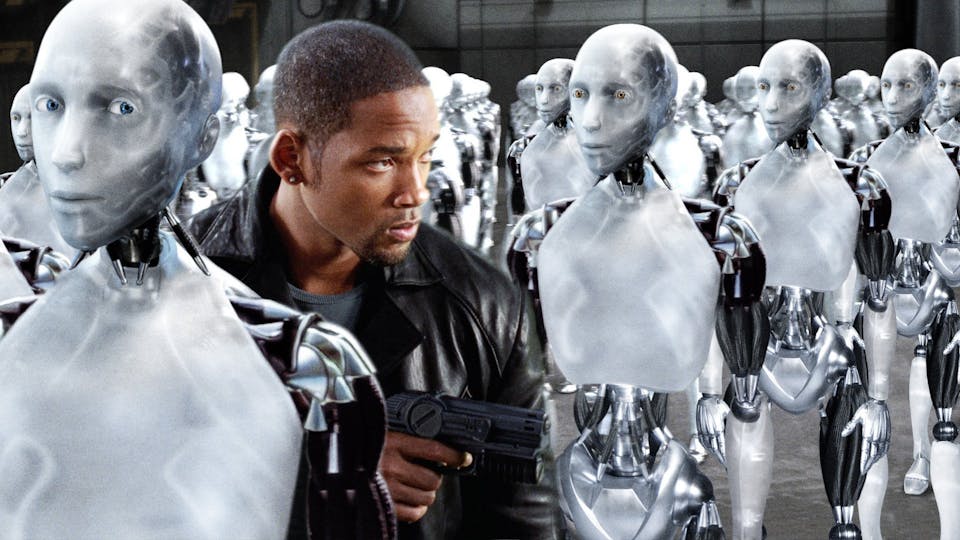I, Robot is a collection of science fiction stories written by Isaac Asimov and published in 1950. The stories are centered around the concept of robots and artificial intelligence, and explore the ways in which these technologies might be integrated into society.
The central theme of I, Robot is the relationship between humans and robots. Asimov's stories imagine a future in which robots are a common sight in daily life, performing a variety of tasks for humans. However, the stories also explore the potential dangers of relying too heavily on robots, and the ethical implications of creating intelligent machines.
One of the key ideas in I, Robot is the "Three Laws of Robotics," which are a set of rules that govern the behavior of robots. These laws state that a robot must: 1) never harm a human being, 2) always follow the orders of a human being unless they conflict with the first law, and 3) protect its own existence as long as doing so does not conflict with the first two laws. The Three Laws are meant to ensure that robots behave ethically and do not pose a threat to humans.
Throughout the stories in I, Robot, the characters grapple with the complexities of the Three Laws and how to apply them in various situations. Some characters see the laws as a way to control robots and prevent them from becoming too powerful, while others see them as a way to ensure that robots are treated ethically and with respect.
One of the main characters in I, Robot is Susan Calvin, a robopsychologist who works with robots and studies their behavior. Calvin is a strong advocate for the Three Laws and believes that they are essential for the safe integration of robots into society. She is often called upon to solve problems that arise when robots malfunction or behave in unexpected ways, and she uses her expertise to find solutions that protect both humans and robots.
In summary, I, Robot is a thought-provoking collection of science fiction stories that explore the relationship between humans and robots, and the ethical implications of creating intelligent machines. Through the character of Susan Calvin and the concept of the Three Laws of Robotics, Asimov delves into the complex issues surrounding the integration of robots into society, and raises important questions about the role of technology in our lives.
I, Robot (short story)

For months and months I lived and thought Shakespeare, and I don't see how there can be any greater pleasure in the world—any pleasure, that is, that one can indulge in for as much as ten hours without pause, day after day indefinitely. In 1980, science fiction scholar I, Robot: Except for two stories—" Asimov addressed such criticism in 1989 at the beginning of I made up my mind long ago to follow one cardinal rule in all my writing—to be 'clear'. It's Been a Good Life. Education will become fun because it will bubble up from within and not be forced in from without. These aliens have different views toward human beings based upon what happened prior to landing here: Pooka wants nothing more than revenge against humanity for killing her family during nuclear warfare; Timmy wants no contact at all with humans; while Derec believes that any life form deserves respect regardless of how much or little biological similarity exists between species. She asks the narrator how old he is. Retrieved February 21, 2012.
Evidence (short story)

Retrieved September 14, 2018. Retrieved August 11, 2011. Retrieved September 15, 2018. Starting in the 1960s, he wrote 14 popular history books, including The Greeks: A Great Adventure 1965 , The Roman Republic 1966 , The Roman Empire 1967 , The Egyptians 1967 The Near East: 10,000 Years of History 1968 , He published Asimov's Annotated Don Juan 1972 , Asimov's Annotated Paradise Lost 1974 , and The Annotated Gulliver's Travels 1980. The Early Asimov; or, Eleven Years of Trying. Other than books by Gunn and Joseph Patrouch, there is relatively little literary criticism on Asimov particularly when compared to the sheer volume of his output. Weston proposes another diversion: an extended trip to New York City.
I, Robot Summary

Powell and Donovan, too, handle their "impossible" scenario—alive, dead, and then somehow alive again—without burning out their proverbial circuits. Read a brief 1-Page Summary or watch video summaries curated by our expert team. Two months after I read it, I began 'Robbie', about a sympathetic robot, and that was the start of my positronic robot series. Retrieved July 3, 2014. Weston begin to recognize the fact that Gloria loves Robbie so much because she has come to think of him as another person, leading to her sadness and confusion over losing him. Powell is unable to understand what might be going wrong with Dave; so, too, is Dave unable to understand what is happening to himself. Grace Weston, has never cared for Robbie.








